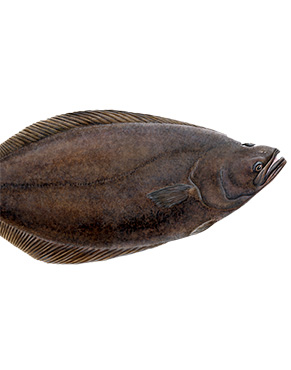How This Helps
Halibut fish is rich in omega-3-fatty acids and is a good source of Vitamin B6, B12 and folic acid that helps to prevent many diseases. In addition, halibut is rich in micronutrients, like magnesium, potassium, niacin, selenium that help provide health benefits as well.
Halibut Health Benefits:
Arthritis | Brain | Cancer | Heart Diseases | Diabetes | Inflammation | Obesity | Alzheimer’s | Liver | Antioxidation | Macular degeneration | Eye disorders |
Instructions
Characteristics:
Halibut is a kind of flatfish and belong to the flounder family. Halibut is found either in the North Pacific or the North Atlantic oceans. The fish lives at depths ranging from few meters to hundreds of meters though it is mainly seen on the ocean beds. Halibut is brown on top with a whitish belly. This helps the fish camouflage itself on the ocean floor (from above) and even against the light (from below).
Halibut Nutrition Facts:
Number: ½ fillet
Serving size: 160g
Nutrients Amount
Total Carbohydrate 0.0 g
Protein 42.4 g
Water 114 mg
Vitamins
Vitamin A 285 IU
Niacin 11.3 mg
Folate 22.3 mcg
Vitamin B12 2.2 mcg
Pantothenic Acid 0.6 mg
Fatty acids
Total Omega-3 fatty acids 1064 mg
Total Omega-6 fatty acids 60.4 mg
Minerals
Calcium 95.4 mg
Iron 1.7 mg
Magnesium 170 mg
Phosphorus 453 mg
Potassium 916 mg
Sodium 110 mg
Zinc 0.8 mg
Selenium 74.4 mg
Source: Nutrient data provided by USDA SR-21
Use It In
– Halibut can be used in daily diet due to its nutritional benefits. It is recommended that you to eat fish at least three times a week for better health.
– Halibut can be grilled, fried, poached, baked or broiled. In addition, halibut can be used in salads, stir-fry, or in making halibut fish cakes.
Pairs With
Halibut has a very mild taste; hence, it can pair with any other food. It pairs best with tangy foods like lemon, orange, tomatoes, vinegar, soy sauce or even with thyme, bell peppers, olives, avocados etc.
Caution
• Do not eat halibut if you are pregnant as it could contain high amounts of mercury. Though high amounts of mercury can affect the nervous system in normal people, it is particularly harmful to pregnant women as it can affect the fetal development.
• An individual suffering from kidney problems or gout should avoid the intake of halibut, due to large amounts of the compound called ‘purines’. Purines break down to form uric acid which results in kidney stones or gout.
• Some people are allergic to halibut. Hence, avoid eating halibut in pure forms as it can aggravate your allergy.
Science and Research
Halibut Health Benefits:
Heart:
Halibut is rich in omega-3 fatty acids that helps prevent arrhythmia, reduces triglyceride levels in blood, lowers cholesterol, regulates blood pressure, improves blood flow and prevents formation of blood clots – all factors that lead to possible heart disease. Fish is also rich in vitamin B12 and B6 along with folic acid that helps lower homocysteine levels which in turn can cause arterial damage.
Cancer:
Regular consumption of halibut is known to reduce risk of developing cancers like kidney cancer and colorectal cancer. Research has also proven that it helps to reduce incidence of leukemia, non-Hodgkin lymphoma, and multiple myelomas.
Liver:
Halibut contains anti-oxidant compound, selenium, that helps to keep healthy liver intact. A healthy liver is able to detoxify various harmful chemicals like pesticides, heavy metals or drugs from our body.
Brain:
Consuming halibut regularly in the diet helps to strengthen nervous system, boosts memory, thus helping patients suffering from Dementia and Alzheimer’s and overall health benefit.







